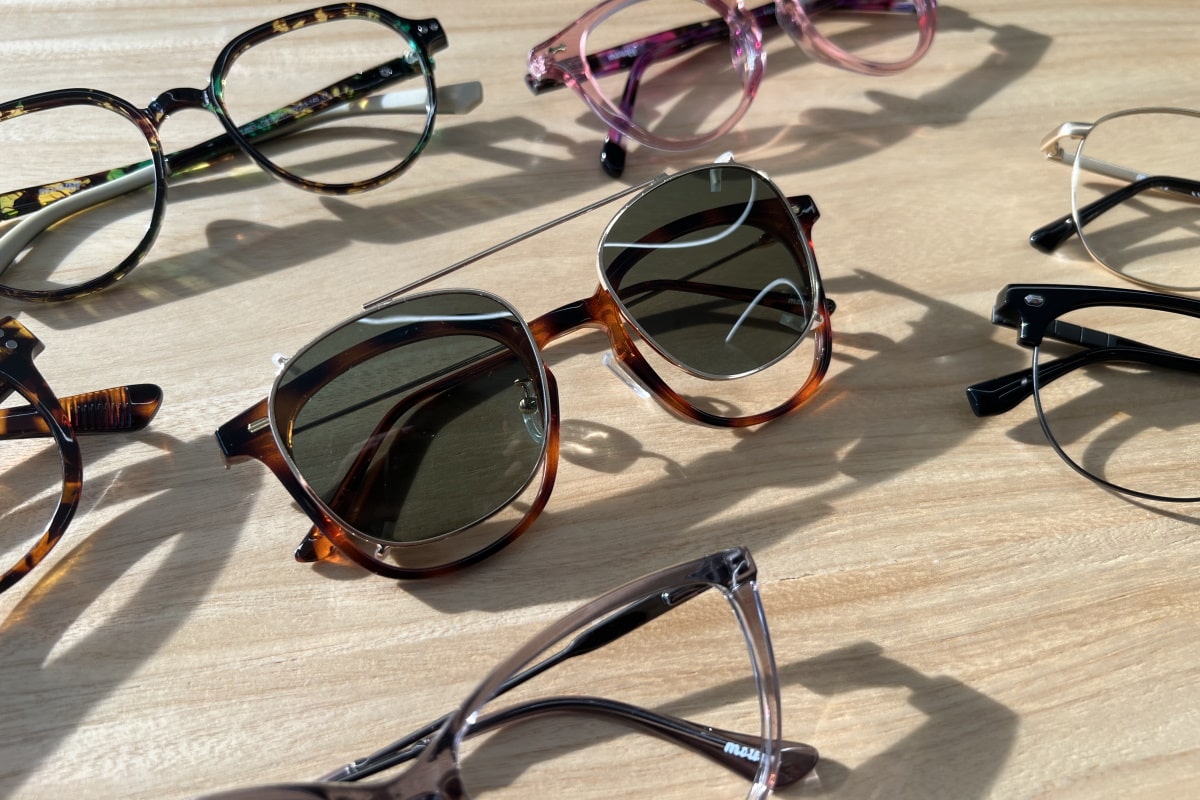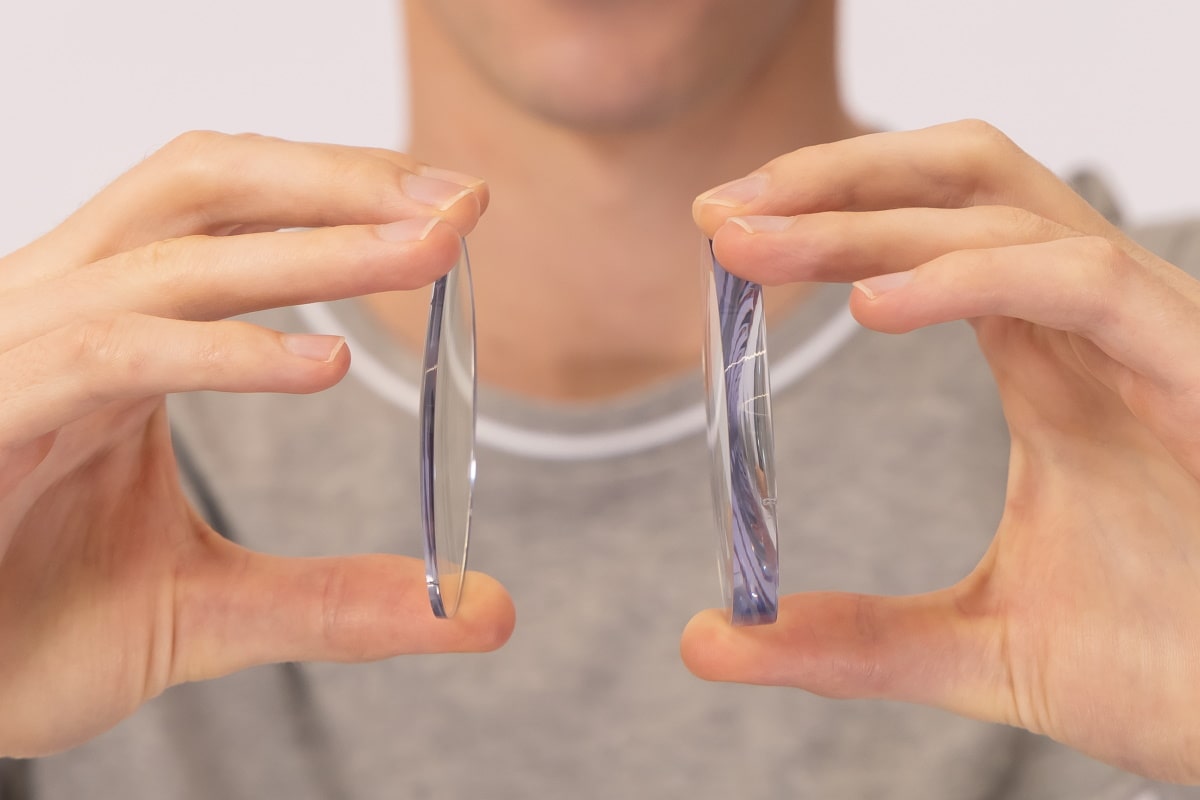Making sure you pick the right lenses is probably THE most important aspect of buying a new pair of eyeglasses. How else are they going to suit your eyes?
High-quality lenses with the right coatings and attributes will help correct your vision, but with so many options to pick from, we wouldn’t be surprised if your head is spinning! To spare you the frustration, we’ve created this guide to help you select the lenses that will perfectly suit your visual correction needs. Let’s go!
First step – Know what your visual needs are
First and foremost, your lens’ primary purpose is to provide you with vision correction. And no two eyes are the same, nor have the same needs.
Thankfully, there’s a little piece of paper that can help – your eyeglasses prescription! Your eyeglasses prescription is provided to you by your eye doctor and will highlight some important things your lenses will need to cater towards, such as:
- Are you nearsighted or farsighted?
- Do you suffer from astigmatism?
- What’s your pupillary distance?
- Do you require single vision or multifocal lenses?
If you’re unsure how to read your prescription, we’ve created a guide to understanding your prescription here for you to easily make sense of it.
Now – let’s look at the most common lenses on the market that can meet these needs.
What types of eyeglass lenses are there out there?
Different folks have totally different visual needs. Some need help to see nearby objects, some need help seeing far, and many fall somewhere in between.
Here are some of the most common lenses on the market that cater to such needs:
1. Single-vision lenses
Single-vision lenses are THE most common type of prescription lenses. As you can probably tell from the name, the lenses in these glasses have just a single optical prescription correction. They’re typically used for distance or reading glasses. In other words, they’re commonly used to correct near-sightedness (myopia) or far-sightedness (hyperopia).
At Mouqy, we offer a range of single-vision lenses that you can get in clear, or blue light blocking variations.
Single-vision distance lenses
Single vision distance lenses provide proper vision correction for people who are either near or farsighted. The ‘single vision’ refers to the fact that the lenses only provide one focal length. For example, if you’re unable to clearly watch TV from the other side of the room, you may be prescribed a pair of glasses with a single-vision distance prescription so that you’re able to view the screen clearly.
Single-vision reading lenses
Reading lenses are designed to help you see things at a close distance. In general, many reading prescriptions are for people with (+) prescriptions, however nearsighted people can also require reading glasses when doing tasks that require up-close focus.
Astigmatism lenses
Single vision lenses are commonly prescribed to correct astigmatism as well. People with astigmatism usually suffer from a refractive issue whereby light doesn’t get focused evenly on the retina, which results in blurred vision when looking at a distance or near.
2. Multifocal lenses
Multifocal lenses, in contrast to single vision lenses, actually incorporate a range of different prescriptions within a single lens. This allows users to see things clearly at different distances, all through the same lens.
Examples of this type of lens includes:
- Bifocal lenses
- Trifocal lenses
- Progressive lenses (which change power from the top to the bottom of the lens, in a seamless transition).
At Mouqy, we don’t currently offer multifocal lenses. However, keep an eye out in the near future!
3. Blue light blocking lenses
Many of us spend long hours in front of our laptops and devices, both for work and play. Blue light blocking lenses have the ability to protect our eyes from the harmful blue light – a high energy light typically emitted from anything that has a screen.
Even exposure to regular sunlight can cause your eyes to be exposed to blue light. Using such lenses can help us to combat digital fatigue and enjoy better sleep at night.
At Mouqy, almost ALL our prescription and non-prescription glasses come with the option of blue light blocking lenses.
Next – Choose a material and lens index for your lenses
Although we still call them ‘eyeglasses’, glass is actually no longer used for most lenses as it’s such a fragile and heavy material. That’s right, most lenses are actually made out of plastic!
This has plenty of advantages, as plastic can be modified in ways that enhance its durability and ability to bend light. This leads us nicely to one of THE most important things to understand about lenses – lens index.
Lens Index might sound complicated – it’s not!
It’s really quite simple. Lens Index is a number that tells you how efficiently the lens material is able to bend or refract light. If you’re buying eyeglass lenses, this number usually ranges from 1.50 to 1.74. The higher the lens index number, the more ‘effective’ the lens at bending light!
Why does lens index matter? Well, because this can indirectly affect the thickness of your lenses.
In the past – the stronger your prescription, the thicker your lens needed to be. This meant that anyone with a very strong prescription had no choice but to put up with thick and heavier lenses, which could be uncomfortable to wear for long periods of time.
However, these days, many eyewear providers will offer powerful lenses that are made from a higher-index type of plastic that refracts light more effectively than standard lenses.
These types of lenses are called ‘high index lenses’, and usually have an index of 1.60 and higher. This allows your lenses to be cut thinner and be more lightweight – all the while providing perfect vision correction. For that reason, they’re especially recommended for anyone needing a strong prescription.
What lens indexes and materials does Mouqy offer?
Whatever prescription you’re after, at Mouqy, we give you the option between clear lenses, or blue light blocking lenses.
These come in a wide range of lens indexes and materials, so you can simply take your pick of the lens that suits you best.
Here’s an overview of the options we offer, and their special qualities.
1. Index 1.53 Trivex
- Clear lenses only.
- Impact-resistant and durable, suitable for all types of frame style.
- Great choice for lower prescriptions.
- Offers good optical performance.
2. Index 1.59 Polycarbonate
- Blue block lenses only.
- Thin-cut, suitable for all types of frame style.
- Great choice for lower prescriptions.
- Extremely durable and scratch-proof.
3. Index 1.60 Aspheric
- Clear lenses, blue block lenses, and plano lenses.
- Slim and lightweight, ideal for full frame, half-frame and rimless frame glasses.
- Great for moderate to strong prescriptions.
- Aspheric lenses offer good optical performance whilst being thin and flattering.
4. Index 1.60 Tribrid
- Clear lenses only.
- Slim and lightweight, but durable. Ideal for full rim, half-rim and rimless frames.
- Great for moderate to strong prescriptions.
- Tribrid material is highly impact-resistant.
5. Index 1.67 Aspheric
- Clear lenses and blue block lenses.
- Ultra-thin cut , ideal for all types of frame style.
- Great for very strong prescriptions.
- Allows those with strong prescriptions to enjoy ultra-thin lenses.
Are high index lenses the right choice for me?
Our Mouqy high index lenses (1.60, 1.67 and 1.74) are made using a special type of material that is designed to refract light more effectively. This allows them to be cut thinner without compromising on vision correction.
Here are just a few reasons why many people love high index lenses over traditional thicker ones:
- They’re compatible with almost any style of frameHigh-index lenses can be paired with almost all of them – including rimless or semi-rimless styles!
- They’re lightweight and more comfortableSince high index lenses are cut thinner, they are much lighter than standard thick-cut lenses, making them much more comfortable for the wearer’s nose and ears.
- You’ll get more choices of lensHigh index lenses can cater to both strong and weak vision correction prescriptions, and they’re available in plenty of options, including single-vision lenses or multifocal lenses.
- They look amazingHigh index lenses are cut thin and are aesthetically pleasing, allowing you to pair them with frames that are compatible with your face shape.
However, due to the materials needed to produce them, high-index lenses do come at a higher cost compared to standard plastic lenses.
It’s always best to talk with your eyecare professional regarding your need for high index lenses. That said, here are a few things that might indicate they’re a good choice for you:
- You need a strong prescription.
- You’re sensitive to the weight of your eyeglasses.
- You’re motivated by style.
- You’re looking for rimless or semi-rimless frames.
For more details on which lens index may suit you best, check out our Lens Index Guide.
How to choose lenses for non-prescription glasses
Many people who don’t require visual correction may still want to order glasses as a fashion accessory or to protect their eyes from blue light.
If you’re ordering non-prescription (a.k.a. “Plano”) glasses, many eyewear providers will still allow you to choose between different lens materials with different indexes. At Mouqy, all our Plano glasses come in Index 1.60 Aspheric. These are:
- Slim and lightweight, ideal for full frame, half-frame and rimless frame glasses.
- Great for moderate to strong prescriptions.
- Offer good optical performance whilst being thin and flattering.
Whilst CR39 1.5 index offers the best optical performance in terms of clarity, the Polycarbonate 1.59 may be a better option if your daily life involves a lot of exercise or strenuous activity. According to the American Optometric Association, polycarbonate is the most impact-resistant material used in safety goggles! It’s tough stuff.
Which eyeglass lenses are best for me?
If you’re trying to decide which eyeglass lenses are best suited for your everyday use, here are a couple of questions you might want to run yourself through.
1. Do I want blue light blocking technology?
Our Mouqy frames can be purchased with or without blue light blocking technology. If you spend a lot of time in front of screens or devices, then opting for our blue light blocking lenses may be a great idea to protect your eyes. However, if you don’t spend much time on devices or are on a lower budget, our clear lenses may be a better fit.
2. What’s my budget?
Blue light blocking lenses tend to be more expensive than clear lenses, due to the technology that goes into them. In addition, high-index lenses, or Tribrid lenses tend to be a little more expensive, due to the materials used. However, since these days it’s possible to buy glasses online at much more affordable rates, you might still be able to find high-index or blue light blocking glasses that can meet your budget. At Mouqy, we’ve tried to keep things as affordable as possible.
3. What’s my lifestyle like?
If you’re very active and your daily life involves a lot of contact sports or strenuous activities, you might want to lean towards more durable lenses, such as polycarbonate, Trivex or Tribrid. On the other hand, if you’re using glasses to do very precise visual tasks such as graphic design or video editing, you may want to prioritize optical performance by opting for a lower-index lens, like the 1.53 Trivex. It’s all about finding the balance!
4. What lenses can meet my own visual needs?
Not all lenses can cater for your individual eye needs. Stronger prescriptions may only be able to be catered for by higher-index lenses. Always make sure to double check that your glasses lenses are able to meet your prescription needs.
5. What kind of aesthetic do I prefer?
Bear in mind that certain frame styles can only support certain types of lenses. For example, thin lenses are necessary if you want rimless or semi-rimless frames. Or, you may simply have a preference between the look of thin-cut or thick-cut lenses.
Why do we coat ALL our lenses at Mouqy?
Some eyewear providers go a little further and add multi-functional coatings to their lenses.
Why? Well, the right coatings can help keep your lens scratch-free and prolong the life of your glasses. After all, you want your glasses to be able to go through everyday life with you and help you get things done!
At Mouqy, we automatically add multifunctional coatings to all our eyeglass lenses. These serve different purposes and change the way your lens behaves in different environments.
Here’s an overview of all the multi-coatings we add to our Mouqy collection:
1. Water-repellent
By coating our lenses with a superhydrophobic material, your eyeglasses will efficiently repel liquids, allowing them to stay functional and clean at the same time!
2. Anti-reflective
The anti-reflective coating gets rid of light halos and reflections caused by screens and lights, which makes your glasses less distracting during in-person or Zoom meetings. Best suited for people that spend most of their time in front of the computer or driving at night.
3. Scratch-resistant
No matter how much you take care of them, your glasses are bound to receive scrapes and scratches over time. The scratch-resistant coating protects your lenses from everyday wear and tear, which helps prolong lens life.
Tips for caring for your eyeglass lenses
Finally, here are a couple of tips to help you get the most wear out of your eyeglass lenses, no matter where you’ve bought them from.
- When not in use, always store your glasses in a clean and dry place such as a hard shell glasses case.
- Don’t put unprotected glasses in a purse, pocket, or bag.
- Avoiding wiping your lenses with tissue or paper towels, as these can have a rough surface that can scratch your lenses. Instead, use a non-lint cloth, like a microfibre cloth, dampened with water or a cleaning solution to clean your lenses.
Now you know your lenses – What about the frames?
Now that you know how to select functional lenses to serve your visual correction needs, you can confidently explore our catalog to pick one that suits you!
Have fun shopping the Mouqy range and don’t forget to use our Virtual Try-On tool to see which suits you best. We can’t wait to see you with your brand new Mouqys!











